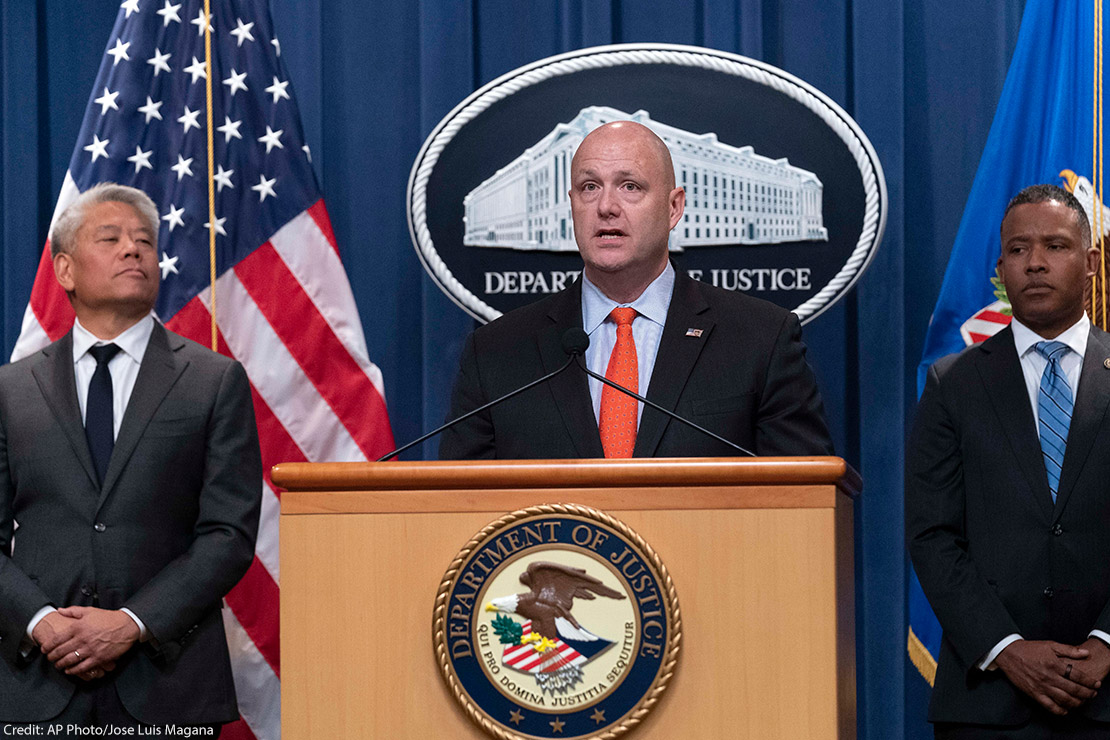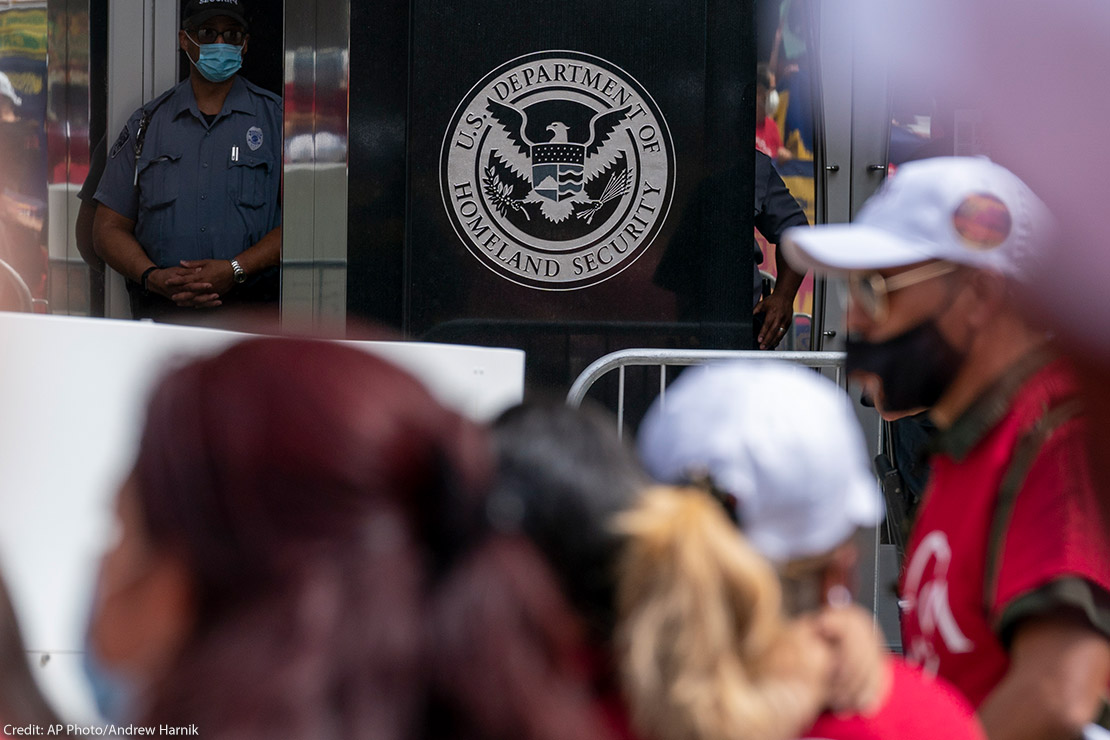Immigration and Customs Enforcement (ICE) has new leadership, with the appointment last week of P.J. Lechleitner as acting director. ICE has not had a Senate-confirmed director since the Obama administration, making Lechleitner’s appointment as acting director more significant — and potentially likely to last through the end of Biden’s term.
The big question is whether Lechleitner is willing to move forward on a reform agenda that has been stalled for the last year. The good news is that in June, the Supreme Court removed a major obstacle to ICE reforms, shutting down litigation brought by anti-immigrant attorneys general in Texas and Louisiana that had aimed to force Biden to pursue a draconian deportation agenda. (The ACLU filed an amicus brief in the case).
The ugly politics of immigration remain a major barrier. House Republicans are still trying to impeach Department of Homeland Security Secretary Alejandro Mayorkas — Lechleitner’s boss — over his handling of the border, although they have not been able to muster the votes. Lechleitner will need to overcome the chilling effect of the threatened impeachment proceedings, as well as pre-presidential election anxieties around immigration.
But there are common-sense, impactful changes that Lechleitner can make as acting ICE director — ones that will help President Biden show that he’s made good on his campaign promises. Here are three of them:
Shut Down ICE Detention Sites
On average, ICE is detaining about 29,000 people a day in dozens of detention sites around the country — the overwhelming majority of which are run or operated by for-profit prison companies.
During his campaign, then-candidate Biden promised to “end for-profit detention centers.” In April 2021, he told activists in Georgia that “there should be no private prisons, period, none, period. … Private detention centers: they should not exist, and we are working to close all of them.” A poll we commissioned supported Biden’s convictions: 68 percent of voters wanted to see the federal government stop pursuing contracts with for-profit prison corporations.
Though Biden’s pledge only focused on for-profit detention, activists and the ACLU have called on him to dismantle the mass detention system more broadly. So far, ICE has closed or discontinued use of a handful of facilities, but far more is needed. ICE’s new acting director should order a new, comprehensive review of ICE detention facilities for health, safety and due process issues — and swiftly act to close abusive facilities.

Patrick J. Lechleitner
Credit: AP Photo/Jose Luis Magana
High on his list should be Baker County Detention Center in Macclenny, Florida, described as a “living hell” by a person formerly detained there. The ACLU of Florida has documented sexual voyeurism, such as staff watching women when they use the restroom; women being denied sanitary napkins and clean clothes as punishment, leading to infections and being forced to sleep in blood-soaked sheets; medical neglect and beatings; and much more.
These examples are disturbing, but sadly, not exceptional. The ACLU and our partners have documented horrific conditions and shameful treatment in ICE detention sites across the country — under Biden’s watch. Leichleitner should lean into the issue — and move forward on closing detention sites.
Roll Back ICE’s 287(g) Program
President Biden also promised to roll back ICE’s 287(g) program, which taps local law enforcement to help identify people for arrest and deportation. Through 287(g) and related programs, local police have helped ICE ensnare thousands of people in an indiscriminate deportation dragnet — the opposite of the limited approach the Biden administration initially promised. As a candidate, Biden recognized that turning local police into immigration agents harms public safety by making people in immigrant and mixed-status households afraid to access protection and public services . He pledged to end agreements initiated in the prior four years.
The Trump administration aggressively recruited sheriffs to join the 287(g) program, using anti-immigrant hate as a selling point, and the program exploded to five times its Obama-era size. Despite its alarming growth under Trump — and recent protests by activists around the country — the Biden administration has left the 287(g) program mostly intact. An April 2022 ACLU report detailed how, through the 287(g) program, the Biden administration is empowering sheriffs with records of racism, anti-immigrant hate, and civil rights violations in direct contravention of its racial justice commitments.
Biden has likely failed to cut back on 287(g) because reform-minded officials believed that ICE’s enforcement priorities, which direct ICE agents to focus their arrests and deportations on immigrants with particular immigration or criminal law violations, would staunch abuses by local law enforcement agencies. But history suggested it wouldn’t work, as we warned early on. Priorities are far from a panacea: Data obtained by the American Immigration Council and Immigrant Legal Resource Center shows that under Biden nearly half of ICE’s requests to other law enforcement agencies to hold people for deportation purposes (known as detainers) were for people who fell outside ICE’s enforcement priorities.
And because many ICE agents are not applying the priorities in practice, anti-immigrant local law enforcement officers can use 287(g) as a tool to promote indiscriminate deportations. Empowering those officers, particularly ones from departments with a track record of anti-immigrant and racist statements and actions, to make decisions about immigration enforcement effectively invites abusive practices like stopping Black and Brown individuals in traffic stops under pretexts, and funneling them into a deportation pipeline.
Lechleitner should move to end 287(g) agreements with abusive sheriffs, starting with the ACLU’s list of 54 sheriffs with egregious records.
Review ICE Street Enforcement Tactics
The Biden administration fulfilled an important pledge to end worksite raids, which the Trump administration had used alongside other mass raids, for political ends. But it’s all too easy to imagine a future administration deploying ICE agents on America’s streets in a drive to make this a hostile, dangerous place for our immigrant neighbors and loved ones.
As we have documented, in the past ICE agents have impersonated police, disguised themselves as day laborers, represented themselves as probation officers and tricked people into locating a family member so they can arrest them. The ACLU has filed lawsuits challenging these practices in California and Illinois.
Lechleitner should look at lasting reforms to ICE’s arrest practices, including putting ICE agents under meaningful supervisory pre-approval constraints and prohibiting them from impersonating local police.
These are just three ways that the Biden administration, under Lechleitner’s new tenure, can take meaningful steps toward reforming harmful ICE detention and enforcement practices. But the work doesn’t end there, and we will continue to push the administration to use all the tools at its disposal to build a more humane immigration system.



